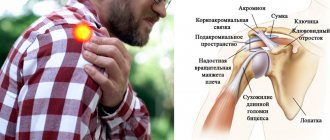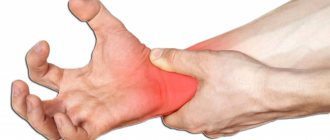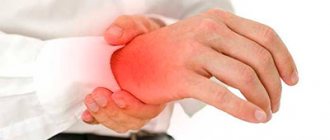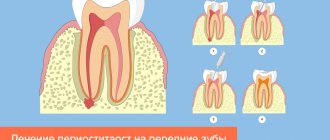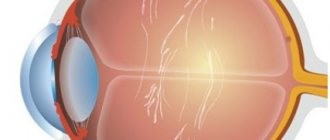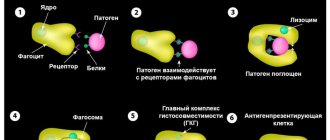What is hand numbness and its causes?
Many people are familiar with the unpleasant feeling of tingling, “crawling on the skin,” as well as pain, decreased sensitivity and deterioration of mobility in the limb. All of these manifestations characterize numbness, which can occur in the arms, legs and other areas of the body. It is associated with impaired blood circulation in the tissues or compression of the nerves.
Along with numbness in the hands, the following symptoms may also occur:
- burning sensation;
- muscle spasms;
- tingling sensation;
- pain in hands, fingers;
- feeling of itching;
- tingling and numbness that gets worse when you move your fingers;
- increased sensitivity to touch;
- pain in the cervical spine.
Incorrectly selected pillow and uncomfortable sleeping position
In order for the body to fully recover and gain strength during sleep, it is important that the pillow is comfortable, and preferably orthopedic. An incorrect, high pillow forces the spine to unnaturally arch in the neck area, causing your arms to go numb during sleep.
There is a disruption in the blood supply and nutrition of the nerve endings of the cervical spine. In the compressed area, blood circulation weakens, and the limbs, especially the hands, begin to go numb.
It is very important to choose not only a suitable pillow, but also choose a comfortable sleeping position and clothing that does not restrict movement.
All this can lead to numbness in your hands. Despite the fact that this problem is not serious and can be solved very quickly, it still causes inconvenience to a person.
Hands thrown back behind the pillow very often cause numbness. At night, when the body is sleeping, the heart works a little slower than usual, so blood may not flow to the hands in sufficient quantities, especially if a person occupies an unnatural position during sleep.
Causes of numbness in the left hand:
- Cardiac ischemia. In addition to numbness in the left arm, there is discomfort in the chest. If after taking nitroglycerin or stopping the physical activity that caused the symptoms, these manifestations disappear, then it is angina pectoris. In addition to numbness of the left arm, it is accompanied by chest pain in the heart area, panic, pale skin, nausea, shortness of breath, and cold sweat.
- Myocardial infarction. Sometimes hand numbness is the only sign of this acute cardiovascular disaster. During an attack, the patient experiences intense pain and a feeling of constriction in the chest, shortness of breath, and interruptions in the functioning of the heart. The skin becomes covered with cold sweat. Along with numbness in the hand, a person experiences pain radiating to the lower jaw, stomach, and the area between the shoulder blades.
- Atherosclerosis. Due to atherosclerotic damage to the blood vessels, decreased strength and numbness in the arm may occur. Symptoms intensify when raising the limb upward.
- Stroke. Numbness in the left hand may indicate damage to the right hemisphere of the brain. In this case, the upper and lower limbs on the left side become numb, vision and speech are impaired. Along with numbness in the hand, a stroke can cause a complete loss of sensation in the hand. Other symptoms of cerebral hemorrhage include weakness in the limbs, loss of coordination, severe headache, blurred vision, nausea and vomiting, and irritation from bright lights and sounds.
- Vegetative-vascular, or neurocirculatory dystonia. This is a complex of autonomic disorders that is associated with disorders of nervous regulation. In addition to numbness of the left hand, it may be accompanied by headaches, insomnia, pressure fluctuations, arrhythmia, and panic attacks.
- Raynaud's disease. The pathology is accompanied by paroxysmal circulatory disorders in the arteries of the extremities. Along with the numbness of the hand, its rapid freezing is felt. In the cold and with excitement, a person’s fingers may turn blue. As Raynaud's disease progresses, not only the hands become numb, but also the legs, chin, nose, and ears.
- Vitamin B12 deficiency. This connection is extremely important for the normal functioning of nerve tissue. With its deficiency, a person not only experiences numbness in the hand, but also suffers from dry mouth and pale skin.
- Osteochondrosis (usually cervical and thoracic). First, the fingers go numb, then weakness develops in the upper limb, and the grip strength of the hand decreases. Sometimes pain is felt along the outside of the shoulder and forearm.
- Overstrain of muscles in the cervical-collar region. Pianists and PC operators suffer from hand numbness due to prolonged maintenance of the same position. The problem lies in the overstrain of the muscles, which compress the nerve fibers responsible for the sensitivity of the limbs.
- Insufficient blood circulation. The upper limb becomes numb due to impaired blood flow due to damage to the walls of blood vessels, for example, in diabetes mellitus.
- Stress and psycho-emotional overload can cause hand numbness.
- Carpal tunnel syndrome. When the median nerve passing through the wrist is compressed, the left hand may become numb. This problem is familiar to people of certain professions (programmers, musicians). Nerve compression can also occur in women during pregnancy due to swelling, as well as in patients after surgery, in obese people.
If your hands are numb
Lately, more and more patients have been appearing in my office who are worried about one single symptom: at night they have to wake up several times due to numbness in their hands. The unpleasant sensations that accompany these phenomena are all described in a fairly similar way: a sharp awakening from pain in the hand, tingling, burning, “crawling” in combination with stiff fingers.
Usually people blame everything on the pillow (and change it more than once), the peculiarities of the posture during sleep (and they come up with various “limiters” so as not to turn on their side or on their stomach), “weak heart” (and they buy unnecessary medications in order to “ heal")...
In the end, exhausted, they come to a neurologist so that the doctor can find in their body what is interfering with proper rest and eliminate the inconvenience. And the doctor again walks in a vicious circle: pillow-pose-heart. And makes me do gymnastics. And he prescribes a bunch of studies that will take a lot of time. Couldn't it be faster? No you can not!
Where does such a misfortune come from?
If earlier such complaints were more often made by people whose professional activities were associated with sedentary work and straining their hands (computer operators, drivers, assembly line workers), now schoolchildren, students, and retirees also come. After all, computers have entered the lives of almost everyone. And almost everyone, starting from school, is faced with “computer mouse syndrome” (carpal tunnel syndrome), when mechanical compression of the nerves and blood vessels on the wrist regularly occurs, causing numbness in the fingers. Usually, wearing an orthosis and well-planned position of the keyboard and mouse quickly eliminate the problem, but with numbness at night, not everything is so simple.
Of course, most often the cause of numbness is quite banal - in 90% of cases it is compression of the neurovascular bundle along its entire length: from the spinal cord and aorta to the very tips of the fingers. But there are another 10% of cases when disruption of blood circulation and innervation occurs at a more subtle level - when the smallest vessels and nerve endings are damaged.
This ten percent includes diseases such as polyneuropathy and vasculitis. In order to exclude these pathologies, the doctor gives the night sufferer a long list of tests and examinations. These can be simple blood tests (general and biochemical), hormonal tests, electroneuromyography, duplex scanning of blood vessels, rheovasography, electrocardiogram, neuroimaging (x-ray of the neck, shoulder joints, CT and MRI). The doctor decides what to do and to what extent on an individual basis.
— Doctor, is it possible to do it somehow easier and faster?
Well, I’ll tell you what your “faster” usually looks like.
Stupid self-medication
And so we decided to save time and money on tests, because “we definitely feel that there is nothing serious,” and we enthusiastically take on treatment. On the Internet there are a lot of “folk” recommendations on the topic “how to deal with numbness in the hands”, and at the same time “how to get rid of back pain”. This includes sleeping with a potato in your hand, and massaging the joints of your hands and neck in various ways, and also making baths, compresses and rubbing in strong-smelling tinctures (probably to deter illness).
Does all this help? Yes and no. If one of the folk remedies, used in any form, accidentally affects the cause of the disease, then everything is great. But usually, for some reason, it is after somersaults with Internet advice that patients get worse. Maybe there are those who were cured once and for all by anointing parts of their bodies with turpentine, and no longer go to doctors? Alas, I doubt it...
Your own diagnostician
To figure out for yourself whether there is reason for concern or whether you are simply “tracking” your hands in your sleep (and then just change your position), here are a few simple tests.
Try raising your arms above your head and holding them for 30 seconds. Do you feel tingling? Going numb? Dress for the weather - and go to the neurologist. Do your joints hurt? Make an appointment with a rheumatologist. Place the blood pressure cuff on your arm below the elbow. Increase the pressure in the cuff to 130–140 mm Hg. If no unpleasant sensations appear within a minute, then there is no reason to worry. What if they appeared? And does your left hand go numb when you're nervous? Go ahead - to the cardiologist! Do both hands go numb at once when you're nervous? You may need to consult an endocrinologist. Well, what if there are none of the above symptoms? Then search again. Joke..
Tips to help
First, pay attention to sleep hygiene.
Do not smoke or drink alcohol before bedtime. Nicotine and ethyl alcohol promote short-term vasodilation. Their narrowing will be just in time for the sweetest dream and will provide you with an unforgettable night. Also, don't overeat. The body, which is busy digesting food, simply will not notice the catastrophe on the periphery, in the limbs. There is no need to fall into bed immediately after hard physical work or strength training. Any athlete and loader will tell you how, in this case, overworked muscles ache, spasm to the point of cramps, swell and hurt. And how gratefully they respond to relaxing water treatments and light massages! And less water before bed. Patients with diabetes and pregnant women are especially sensitive to this. Swelling of tissues disrupts metabolism in them and causes irritation of nerve endings. And then numbness and convulsions may occur...
Secondly, you should not sleep in one position all night.
Toss and turn! But at the same time, do not put your hands under your head, do not put them under the pillow. Try not to throw your arms and legs over your bedmate at night. If the fair half has the habit of falling asleep on the chest of a loved one, it is worth learning another habit - to crawl away no later than half an hour of being pressed down, no matter how brave the person being pressed is. For those who like to hug someone in their sleep, there are special C-shaped pillows. Try it - it's very convenient!
Thirdly, the pillow should be comfortable
so that your neck does not bend when lying on your side and does not arch when you lie on your back or stomach. By the way, not everyone likes orthopedic pillows. Many people prefer a “forming” pillow, which you want to roll out “into a pancake”, but you want to knock it into a ball. Plus a light blanket and comfortable, non-squeezing and non-restrictive clothing to help you sleep sweetly! But it’s better to remove jewelry - it’s better for both safety and health.
The population's excessive enthusiasm for mattresses that are too hard (“for back health”) is not at all useful and unnecessary. To experiment, let your pet choose soft or hard bedding - and animals know a lot about a good sleep! - and you will immediately understand what I mean.
Well, fourthly, move!
During the day, try to change your working position, twirl your arms, neck, bend and straighten. Do not hold the telephone receiver between your neck and shoulder, either at work or in the car (talking on the phone is also prohibited by traffic rules), or before going to bed, or in bed at night. Move - it revitalizes! If you carry heavy bags on your shoulders, buy those with the widest handles. If your breasts are larger than B, the bra should have straps +1–2 cm wide for each size. If your neck aches in the evenings, you can put on a Shants collar and walk around in it for 1 to 1.5 hours a day for 2 weeks. Massage also helps a lot.
Well, if all these tricks still don’t lead to the desired relief, make an appointment with a doctor. Helps. Verified.
Valentina Saratovskaya
Photo thinkstockphotos.com
Numbness in the right hand may have the following causes:
- impaired blood flow, pinched nerve due to incorrect position of the limb (for example, during sleep);
- staying in an uncomfortable position for a long time (may be due to the nature of the work, for example, carpal tunnel syndrome);
- frequent carrying of bags, suitcases and other heavy objects;
- long exposure to frost or in a cold room;
- long-term muscle tension of the upper limb.
How to deal with numb hands at home
The situation cannot be ignored if a person is haunted by a feeling of discomfort every night. You can cope with the problem at home, but after mandatory consultation with a specialist in order to exclude diseases dangerous to humans.
If no means help restore restful sleep, neither changing the pillow, nor daytime contrast procedures, then you need to look deeper for the cause.
Folk remedies will help alleviate your condition. Contrast baths are quite
, when hands are alternately lowered first into hot and then into cold water.
After completing the procedure, an ointment containing turpentine is rubbed onto the hands and special gloves are put on to retain heat.
Hands may become numb due to weakened blood vessels; hot water, which should be drunk in small sips on an empty stomach, will help to cope with this problem.
Why does hand numbness occur?
When a patient says that his upper limbs are numb, he may mean:
- a tingling feeling that causes discomfort;
- sensation of “goosebumps” under the skin;
- decreased sensitivity of the skin.
Numbness of the hands does not always indicate pathology. It may be the result of wearing too tight clothes and jewelry that compress blood vessels and nerves.
The most common causes of numbness in the hands:
- Uncomfortable body position, monotonous mechanical work, disrupting blood flow. After changing the position of the limb, the unpleasant sensations disappear.
- Carpal tunnel syndrome (usually affects the working hand due to prolonged monotonous work).
- Atherosclerosis. Accompanied by tingling and numbness of the hands, in the future a decrease in their muscle strength is likely.
- Osteochondrosis of the cervical spine (numbness, usually symmetrical, may intensify after physical activity).
- Diabetic neuropathy (usually both hands go numb).
- Intervertebral hernia in the cervical region (numbness is associated with compression of the spinal nerve roots).
- Ischemic stroke of the brain (threatens numbness and paralysis of the arm).
- Multiple sclerosis (if part of the postcentral gyrus of the brain is affected, the limbs may go numb).
- Thoracic outlet syndrome (compression of nerve trunks and blood vessels in the area of the upper chest opening).
- Brachial plexitis (numbness of the arm occurs due to inflammation of the brachial plexus).
- Damage to peripheral nerves due to alcoholism (alcoholic polyneuropathy).
- Brain tumor (the formation can compress the motor and sensory neurons responsible for the innervation of the upper extremities).
- Raynaud's disease (a disorder of the innervation of small arterioles, more common in women, manifested by numbness and pain in the extremities).
- Rheumatoid arthritis (inflammation and deformation of joints leads to compression of nerve fibers) and others.
Main services of Dr. Zavalishin’s clinic:
- consultation with a neurosurgeon
- treatment of spinal hernia
- brain surgery
- spine surgery
Spinal problems
Various diseases can manifest as numbness in the hands. Periodic numbness of the limbs, dizziness, and headaches should cause a person to contact a neurologist or osteopath. The cause of leakage can be both osteochondrosis and intervertebral hernia. Osteochondrosis is the collective name for a large complex of diseases of the spine, when a disturbance occurs in the metabolic processes of cartilage and bone tissue.
The progression of the disease leads to the destruction of the vertebrae, the spinal nerves begin to be compressed, and numbness and discomfort occur.
People who lead a passive lifestyle and work constantly at the computer are at risk. This could be office workers or schoolchildren. Few people pay attention to their posture and regularly get up to warm up; as a result, with prolonged exercise of the same type, a spasm occurs in the cervical region, and as a result, numbness of the hands both at night and during the day.
Diagnosis of the causes of hand numbness. How to identify?
At the appointment, the doctor examines and palpates the patient’s limb and asks the following questions:
- Where exactly is the numbness felt?
- When did the unpleasant tingling sensation and decreased sensitivity first appear?
- How long does numbness in a limb bother you?
- What actions and movements aggravate symptoms?
- Are there any other complaints, such as burning, itching, tingling, pain?
- How do your arms, hands, and fingers feel—cold or warm?
The main task of the doctor is to determine the causes of hand numbness. It is necessary to exclude systematic mechanical compression of blood vessels, as well as to determine household and industrial factors that could cause disturbances.
Numbness may be a harmless symptom, but it may also hide serious problems - myocardial ischemia, stroke, spinal problems, diabetes mellitus, amyotrophic lateral sclerosis, etc. In this case, the doctor issues a referral to doctors of relevant specializations (cardiologist, endocrinologist, neuropathologist, etc.).
The main emphasis in identifying the causes of numbness is on detecting signs of osteochondrosis. For this, the patient is referred for magnetic resonance imaging, radiography, computed tomography, and electromyography. The purpose of imaging studies for arm numbness is to determine the height of the intervertebral disc, detect osteophytes, and clarify the presence of protrusion or intervertebral herniation.
Carpal tunnel syndrome
Frequent overstrain of the tendons of the hand can cause numbness in the hands, so the condition is called carpal tunnel syndrome. People who work at a computer and do a lot of typing, musicians, and seamstresses most often suffer from it.
– people who perform the same type of actions with their hands every day face discomfort during pregnancy.
On the arm you can find a channel through which the tendons pass. Normally they are protected, but when overstrain occurs, the nerve is compressed and the hand goes numb.
Manifestations of this syndrome can be felt just at night.
The condition requires treatment; if this is not done in time, then complete death of the muscle tissue of the thumb is possible. Women are more susceptible to the disease, and, in the absence of proper treatment, over time the finger will lose its sensitivity and the person will not be able to clench a fist.
Principles of treating hand numbness
The primary task of the doctor is to identify the root cause of this symptom. For this purpose, radiography, myelography, MRI, blood tests, etc. can be performed.
Depending on the nature of the disease that caused numbness in the hands, treatment methods are selected. First of all, the underlying disease is treated. Drug treatment is supplemented by:
- physiotherapy;
- physical therapy;
- reflexology;
- massage;
- diet therapy;
- lifestyle correction.
Why your hands go numb in your sleep: mechanisms of paresthesia
Lack of blood supply . From a simply uncomfortable position, narrow pajama sleeves, a sedentary lifestyle to blockage of small and medium-sized vessels with cholesterol plaques and Volkmann’s ischemic contracture.
Neurological diseases . Destruction of the myelin sheath, disruption of conductivity and trophism, inflammation, overload, toxin poisoning are factors affecting the failure of the transmission of nerve impulses.
Lack of vitamins , microelements; hypovitaminosis, less often vitamin deficiency. The propagation of a signal between neurons requires the presence of neurotransmitters, the synthesis of which requires certain substances and enzymes.
Inflammation . Tunnel syndromes, tennis elbow, golfer's elbow, and injuries are common root causes of numbness in the hands during sleep.
Preventing numbness in the hands
In order to prevent discomfort in the upper extremities, it is recommended:
- exercise regularly (discuss the type and nature of exercise with your doctor in advance);
- maintain the health of blood vessels, joints and the body as a whole (give up bad habits, eat rationally);
- dress according to the season, keep your hands warm;
- take breaks every 40 minutes if your profession involves working on a PC or performing monotonous hand movements.
Prevention of hand numbness
An examination of the body did not reveal any serious diseases, then eliminating numbness will not be a difficult task. You can start with morning exercises, which will affect all limbs and all muscle groups. Morning physical activity will help put your heart into a working rhythm and get your blood circulating.
- Physiotherapy will not be superfluous. The procedure will increase blood circulation. Electrophoresis gives good results.
- Therapeutic exercises that will strengthen muscles, tendons and joints.
- Manual therapy. Massaging the numb area will enhance blood supply to weakened areas.
Not everyone perceives numbness in the hands at night as a signal that it’s time to get examined. Many tolerate this condition, believing that these are manifestations of the norm. Indeed, very often numbness in the hands occurs due to improper sleep and incorrectly selected bedding and, as a rule, this problem is quickly and easily solved. However, if the numbness is systematic and a person experiences it every night, and it does not go away for a long time or both hands are affected, then it is unlikely that it will be possible to do without consulting a doctor.
Treatment with folk remedies
The following recipes help with numb hands:
- as a compress or therapeutic bath, use a mixture of 2 liters of milk, 600 g of salt and 50 g of honey, heated to 60? C;
- apply an infusion of wild rosemary with apple cider vinegar (1:3) 3 times a day;
- infusion of garlic (several cloves) in vodka (400 ml) taken orally, 3-5 drops dissolved in water;
- for 1 liter of vegetable oil - 100 g of ground black pepper, cook for 30–40 minutes, rub the cooled product into the skin of the affected limb.
When is it necessary to see a doctor?
Numbness as a symptom cannot be ignored. Sometimes it becomes the first sign of the development of a serious disease. Numbness often accompanies a stroke. Therefore, you should not hesitate to contact a specialist. If numbness occurs frequently, you should contact a neurologist.
When to visit a doctor:
- There is no way to explain why the numbness occurs.
- Painful sensations appear in the forearm, fingers, and neck.
- The urge to urinate becomes more frequent.
- A rash appears on the body or limb.
- Numbness is accompanied by dizziness, muscle dysfunction and other symptoms.
- Large areas of the body are involved in the pathological process.
- Numbness is bilateral.
Treatment of hand numbness in specialized hospitals
Department of Neurosurgery, City Clinical Hospital named after. A.K. Yeramishantseva sees patients with complaints of numbness in their hands. Here, progressive methods of conservative and surgical treatment of diseases manifested by such symptoms are used. Advanced technical equipment and extensive professional experience of the medical staff guarantee good treatment results. Telephone.
Neurosurgeon Evgeniy Evgenievich Zavalishin treats diseases that cause numbness in the hands. Sign up for a consultation by calling 8 (499) 940-04-30.
Diseases that cause numbness
Diseases that develop in people throughout life are a common cause of numb and tingling fingers. It is imperative to identify incipient pathology in order to prevent serious health problems. Paresthesia may be a signal of impending disease.
Carpal tunnel syndrome
After 40 years, women whose work involves tension in the tendons and joints of the hands feel tingling sensations in the wrist area at the end of the day. The skin in this place itches, goosebumps run across it. The syndrome occurs due to pinching and swelling of the nerve that passes through the carpal tunnel.
From there they control the movements of the palm, fingers, and their sensitivity. First, the syndrome affects the little fingers, then the entire palm. When the pathology spreads and is neglected, the death of nerve tissue occurs. Then sensitivity in the affected area is completely lost. As a result, a person becomes unable to use even a spoon or pen.
Pathological changes in the spine
As a result of orthopedic pathologies, damage and destruction of nerve tissue occurs. The causes of the conditions are related to:
- degenerative processes in the intervertebral discs of the cervical spine (spondylosis);
- hernias caused by a rupture of the outer shell of the disc;
- a pinched nerve in the arm at night;
- osteoporosis.
The consequence of the injury may be what the hands endure. Then the patient will complain not only of numbness, but also headaches and dizziness.
Vascular disorders
Poor condition of blood vessels and disturbances in their structure contribute to numbness in the hands at night. Insufficient blood flow to the extremities is associated with diseases:
- The congenital pathological connection between arteries and veins leads to the fact that the vessels are tangled into a ball. Arteriovenous malformation is the reason why areas of the upper extremities become numb.
- Thrombosis is the formation of blood clots that block passages in blood vessels. Pathology can occur as a result of acute inflammation of the arteries, veins, and poor lifestyle.
- The density of fat and cholesterol deposits on the walls of blood vessels leads to a narrowing of the peripheral arteries. Therefore, blood flow to the hands and fingers is limited.
- With frostbite and a decrease in air temperature in the room, parasthesia of the upper extremities is observed.
- In patients suffering from ischemic stroke, cerebrovascular accident, not only do their hands numb, but their consciousness becomes foggy, they become dizzy, and their blood pressure levels rise sharply.
If even one hand is numb for a long time, you need to contact a specialist. This could be a sign of a stroke or heart attack.
Neurological pathologies
Numbness of the hands at night and after sleep appears in people who are chronic alcoholics and diabetics. Patients with systemic lupus erythematosus have problems with loss of sensation in their hands as the body attacks its own tissues and cells. Limbs go numb when heavy metal poisoning occurs, injuries are sustained, and spinal tumors occur.
Carpal tunnel syndrome is one of the causes of hand numbness
The cause of malignant anemia is insufficient vitamin B12 in the body, hence the loss of sensitivity. Paresthesia that appears as a result of diseases does not go away quickly. This is worth paying attention to. Urgent help is required if sensitivity is lost for an hour and you cannot bend your fingers.
Vascular disorders
One of the complications of diabetes is diabetic neuropathy, damage to sensory, motor and autonomic nerves as a result of impaired blood flow in small vessels. One possible symptom is numbness in the limbs.
There is a large group of diseases - vasculitis. Autoimmune inflammation develops in the vessel wall, it thickens, becomes weakened, and scarring occurs. In the lumen of the vessel, areas of narrowing appear in which blood flow is disrupted. Various organs, including nerves, can suffer from this.
With one of the systemic connective tissue diseases - Raynaud's disease - a spasm of the small vessels that supply blood to the fingers and toes occurs. In response to cooling or stress, a feeling of coldness and numbness occurs in the fingers.
The right hand is going numb: treatment begins with a neurologist
It is necessary to establish a diagnosis in order to correctly understand what to do. If the right hand goes numb, the doctor, based on the indications, selects a diagnostic method: radiography, MRI, CT, electroencephalogram. The first doctor a patient with these symptoms turns to is a neurologist. Then he may recommend contacting a doctor of another profile (cardiologist, endocrinologist, orthopedist, surgeon) or request their consultation in case of a mixed nature of the disease.
The strategy and tactics of drug correction are aimed at eliminating chronic pathology.
Right arm goes numb: treatment with physiotherapeutic methods
Positive dynamics are achieved by combining physiotherapy with medications. The impact occurs using gentle but effective methods, without side effects (subject to proper prescription).
Center for Progressive Medicine "Doctor Pozvonkov" offers:
- relieving compression load using underwater and dry traction of the spine;
- underwater shower, mud and heat therapy;
- massage;
- administration of medications to biologically active points (pharmacopuncture);
- interstitial electrical stimulation;
- electro- and phonophoresis;
- other.
Physiotherapy can eliminate the causes of numbness or achieve stable remission. They are carried out in a course of 10-15 procedures and provide a cumulative effect.
Diagnosis of the problem
The patient's appointment begins with a questioning, which is of no small importance in diagnostic terms. A thorough medical history allows the doctor to suspect the causes of numbness in the hands. After the interview, the doctor begins to examine the patient. During its implementation, it is important to evaluate skin color, its temperature, tendon reflexes, and skin reflexes.
Based on the data received, the doctor refers the patient for further examination, which may include:
- Donating blood for general and biochemical analysis.
- Submission of urine for general analysis.
- Ultrasound of internal organs.
- X-ray of the skull and spine. The study is prescribed if there is a suspicion of an intervertebral hernia or other disorders of the musculoskeletal system.
- Vascular angiography using contrast.
- CT. This study provides maximum information about the condition of the organs. It can be used to detect hematomas, aneurysms, blood clots, circulatory disorders, etc.
- MRI. It is prescribed when the doctor suspects vascular compression.
- Electroneuromyography. This study allows us to identify innervation disorders. Diagnostics are carried out using special electrodes.
After the patient has completed the necessary tests, the doctor will be able to give him an opinion on his state of health and prescribe appropriate treatment.

